scroll for more! ⟶
Cinchy Blog / What is Canang Sari, History, and Its Function
What is Canang Sari, History, and Its Function
Published: 30 Jul 2025
By Syahrial Maulana Sudarto
Travel Enthusiast
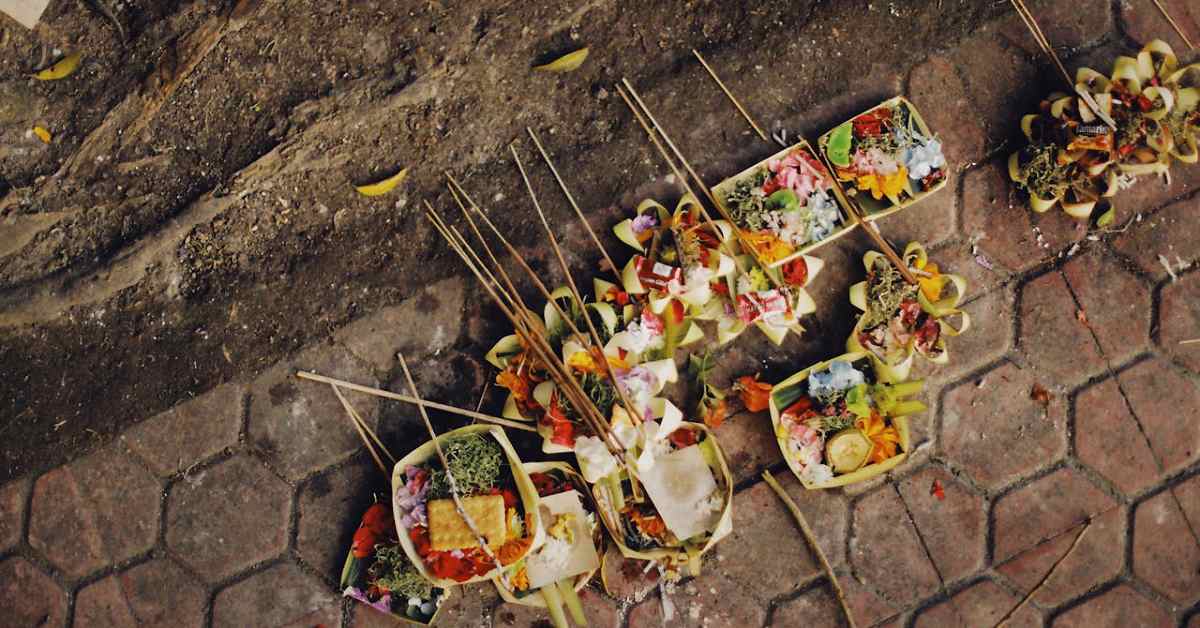
Book Your Ride in Just 1 Minute!
Free Cancellation
24/7 Support
Insurance
Start Date - End Date
Start Time
End Time
Duration
0 Day(s)
Strolling through the vibrant streets of Bali, you'll inevitably encounter small, intricate baskets adorning sidewalks, shop fronts, doorsteps, and even parked scooters.
These colourful, fragrant creations are Canang Sari, the heart of daily devotion in Balinese culture.
But what is Canang Sari exactly? More than just decoration, it's a profound expression of faith, gratitude, and the island's unique blend of Hinduism in Bali.
Let's unravel the meaning, history, components, and deep significance of this ubiquitous spiritual offering.
What is Canang Sari?
At its core, Canang Sari is a daily Balinese Hindu offering. The word "canang" itself translates to "a small basket of flowers," and "sari" means "essence" or "inner beauty."
Thus, Canang Sari embodies the essence of flowers, presented with a sincere heart.
They are carefully crafted from young palm leaves (janur) into small, often square or rectangular baskets, then filled with an array of vibrant flowers, rice, small snacks, and other symbolic items.
These offerings are not merely offerings to deities; they are a fundamental part of the Balinese philosophical concept of Yadnya, acts of sacrifice and devotion for the welfare of the cosmos.
Every morning, and often throughout the day, Balinese Hindus meticulously prepare and present these offerings, a beautiful ritual performed with grace and dedication.
It's a reminder of the island's deep spiritual roots and a physical embodiment of daily gratitude and harmony.
The Rich History Behind Canang Sari
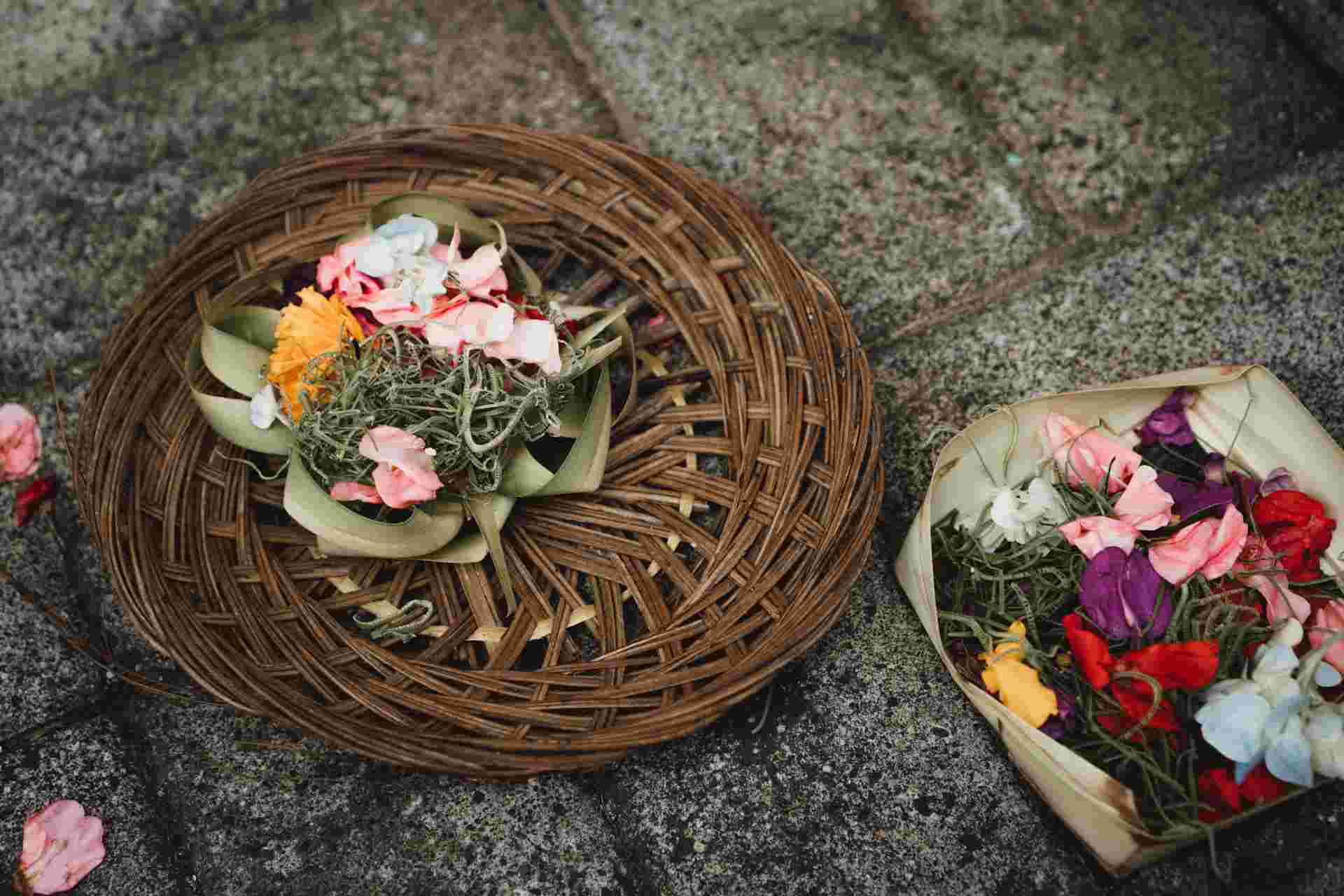
The origins of Canang Sari stretch back centuries, intertwined with the arrival and evolution of Hinduism in Bali.
While the exact timeline is difficult to pinpoint, its roots lie in ancient Vedic traditions from India, adapted over time with indigenous Balinese animist beliefs.
The core concept of making offerings (Banten) to maintain harmony between humans, gods, and nature is fundamental.
Early offerings were likely simpler, using readily available natural materials.
The intricate structure and specific components of the modern Canang Sari evolved as Balinese Hinduism developed its unique character, heavily influenced by the concept of Tri Hita Karana (harmony with God, people, and nature).
It became a standardized, accessible way for every household, regardless of wealth, to perform essential puja (worship) daily.
Its presence signifies the enduring strength of tradition amidst Bali's modern bustle.
The Components of Canang Sari
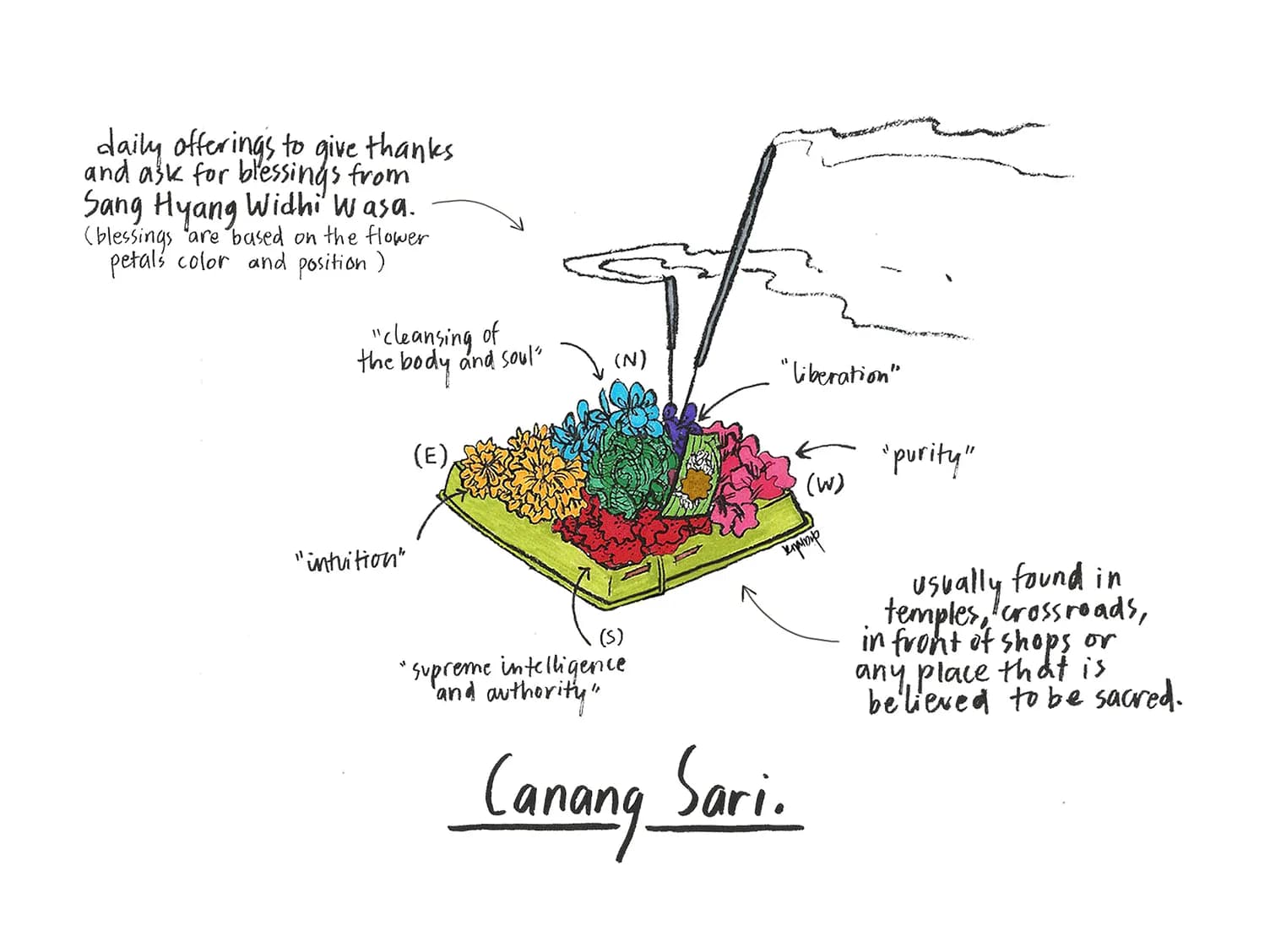
credit: Illustration by Diandra Canti Hadiawan | dribbble.com/diandracanti
A single Canang Sari is a miniature universe, each element carefully chosen for its symbolic value. Understanding its parts deepens the appreciation for what is Canang Sari:
Celemik: This is the base, the small, intricately woven basket made from young palm leaves (janur). It represents the human body or the universe itself, the vessel holding all the sacred elements.
Flowers: The most visually striking part, flowers are chosen not just for their beauty but for their specific colors and directional symbolism. White flowers (like jasmine or frangipani) face East, dedicated to Iswara (a manifestation of Shiva). Red flowers (like hibiscus or rose petals) face South for Brahma. Yellow flowers (like marigolds or cempaka) face West for Mahadewa (another manifestation of Shiva). Blue or green flowers (like periwinkle) face North for Vishnu. This arrangement honors the deities of the cardinal directions and the Trimurti (Brahma, Vishnu, Shiva), representing creation, preservation, and destruction.
Rice: A staple of life, rice symbolizes the sustenance provided by God, signifying gratitude for daily provisions.
Porosan: A folded betel leaf, lime, and gambier paste, the porosan is considered the heart of the offering. It symbolizes sincerity, purity of mind, and the unification of the Trimurti (Brahma, Vishnu, and Shiva).
Kekiping / Snacks: Small traditional snacks or biscuits are included, representing material desires and offerings to the bhuta kala (lower spirits or elemental forces) to appease them and maintain balance in the unseen world.
Salt: A symbol of preservation, purity, and the element of earth.
Coins: These traditional coins represent self-sacrifice, representing the tangible wealth offered as part of the devotion.
Incense (Dupa): The fragrant smoke of the dupa carries the prayers and intentions heavenward, purifying the atmosphere and connecting the material world with the spiritual realm.
Water: Often sprinkled from a small sprig, holy water is used for purification and blessing the offering.
The Profound Function of Canang Sari
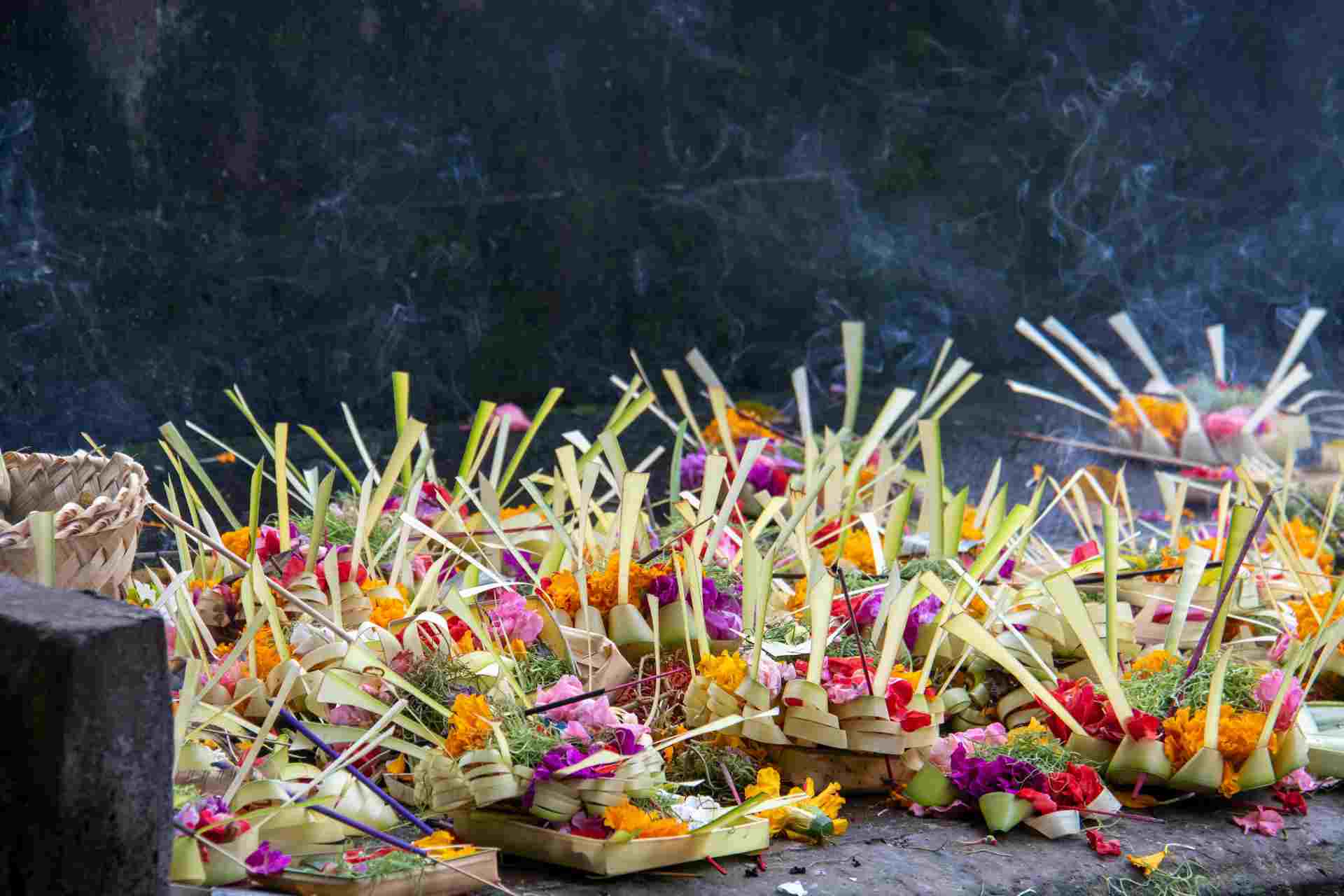
The act of presenting Canang Sari is far more than a simple ritual; it embodies deep spiritual functions that permeate every aspect of Balinese life. Understanding these functions provides a complete answer to what is Canang Sari for the Balinese people.
Expression of Gratitude: This is the foremost function. Every Canang Sari is a heartfelt 'thank you' to Sang Hyang Widhi Wasa (God Almighty) for the blessings received, for life itself, and for the harmony of the universe. It is a daily acknowledgment of divine grace.
Harmony and Balance (Tri Hita Karana): This fundamental Balinese philosophy emphasizes harmony between God, humans, and nature. Canang Sari plays a crucial role in maintaining this balance:
Parhyangan (Gods): Offerings made to the deities in the temple (Pura) and shrine (Pelangkiran).
Pawongan (Humans): The act of preparing and offering fosters a sense of community, shared devotion, and connection among people.
Palemahan (Environment / Bhuta Kala): Offerings are placed on the ground to appease the lower spirits and maintain equilibrium with the natural world, ensuring prosperity and preventing misfortune.
Self-Purification and Spiritual Connection: The mindful preparation and offering of Canang Sari is a meditative act. It's a moment of reflection, humility, and conscious connection to the divine, purifying the mind and spirit.
Daily Ritual: Canang Sari is a cornerstone of daily life, observed consistently morning, noon, and evening. This routine provides structure to the spiritual practice, ensuring that sacred offerings are consistently made.
Symbol of Life's Cycles: The daily creation and temporary nature of Canang Sari mirrors the cycle of life, death, and rebirth, highlighting the impermanence of material things and the eternal nature of the spirit.
Read Also:
What to See in Sanur Bali for Culture & Charm
10 Famous Temples in Bali: Best Spiritual Tourism Destinations
4 Temples in Seminyak Bali for Cultural Visit
Why You Shouldn't Step on Canang Sari Carelessly
Given their profound significance, it's incredibly important to understand why Canang Sari should always be treated with respect.
Stepping on a Canang Sari is considered disrespectful not because it's forbidden, but because it disrupts the sanctity of the offering and the intention behind it.
These aren't just stuff; they are sacred offerings that carry the devotion and gratitude of the Balinese people, dedicated to the divine and to maintaining cosmic balance.
When you see a Canang Sari on the ground, especially in public areas, it means it has already served its purpose in the worship.
The offerings are biodegradable and are naturally left to return to the earth.
However, out of respect for the Hindu rituals and the deeply held beliefs of the local community, it's always best to walk around them rather than stepping over or on them.
This simple act demonstrates your understanding and appreciation of Balinese culture and their beautiful spiritual practices.
Explore Bali's Spiritual Beauty with a Scooter from Cinchy!
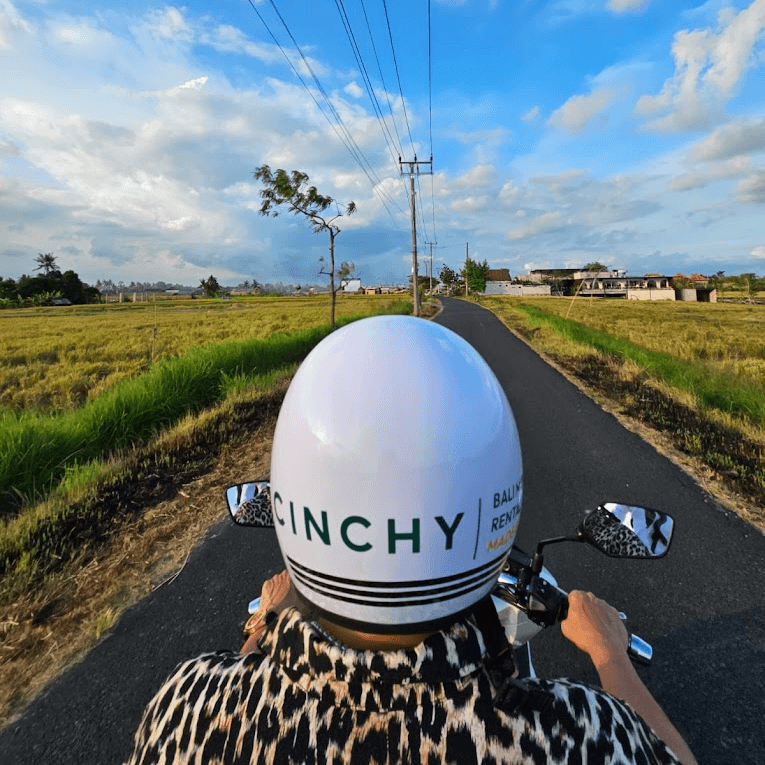
Explore Bali with scooter
Now that you have a deeper understanding of what is Canang Sari and its integral role in Balinese life, you're better equipped to appreciate the island's unique spiritual tapestry.
To truly immerse yourself in this rich culture, having the freedom to explore at your own pace is key.
That’s where Cinchy comes in!
As Bali's trusted motor rental service, Cinchy offers:
Well-Maintained and Safe Scooters: All our motorbikes are in excellent condition, regularly serviced to ensure your safety as you navigate Bali's roads and discover its hidden gems.
Competitive Prices: Cinchy offers a variety of rental packages, from daily to monthly, at budget-friendly rates. Daily Rental starts from just IDR 95,000/day (~US$5.84 or AU$9). Weekly packages are available from IDR 560,000 (~US$34.44 or AU$53.38), and Monthly Rental from IDR 1,500,000 (~US$92.24 or AU$142.97), ideal for long-term travelers enjoying Bali's spiritual ambiance.
Quick and Easy Rental Process: Getting on the road is a breeze! Just bring your Valid ID (Passport or KTP), Valid Driving License (International or SIM C), Round trip flight tickets, and Hotel bookings for the duration of the scooter booking. We pride ourselves on a hassle-free experience.
24/7 Service: Our customer support is available around the clock to assist with any needs you might have during your exploration in Bali.
Delivery and Pickup Service: For ultimate convenience, we offer free motorbike delivery and pickup service for major urban areas in Bali, especially near Seminyak.
Every Cinchy rental includes fantastic facilities for your comfort and safety, with a helmet, hair nets, phone holder, and raincoat.
Don't just visit Bali; experience it intimately.
Rent a scooter from Cinchy and let the island's magic unfold before you, one mindful journey at a time!

